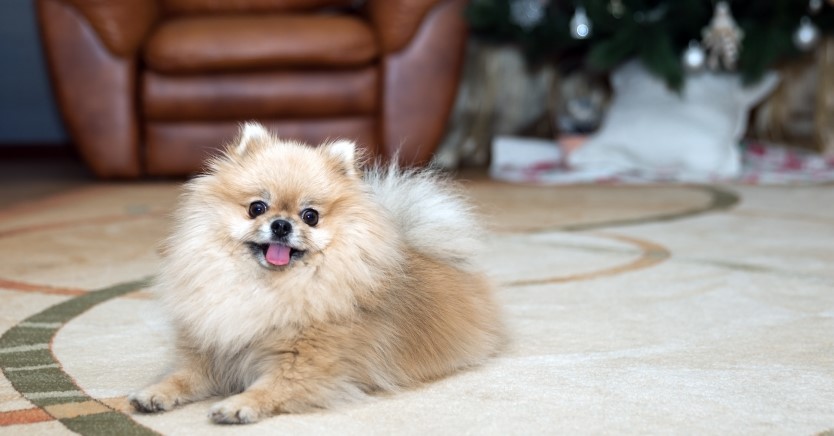Ask Dr. Jenn: My Pomeranian Scoots on the Carpet and Cries. How Can I Help Her?
I have a 2-year-old Pomeranian who scoots on the carpet and cries. It makes me so sad when she does this. I have had her glands expressed, taken her to the vet, we have also taken her to the 24-hour clinic when it was really bad. They did x-rays and found gas bubbles throughout her intestines. They diagnosed her with severe gastritis and gave me Gabapentin and Zofran. I give them to her when she is crying and in pain. The medications help her feel better, but it is not getting the problem solved. Do you have any suggestions for my fur baby Tieneka?

I am sure it must be heartbreaking to watch your sweet little dog go through this. I am glad the medications help, but it would be better if she didn’t get to the point where she was so uncomfortable she has to be medicated.
It sounds like Tieneka may have two separate problems. Gastritis is inflammation in the stomach. This can cause nausea and vomiting as well as pain, but it doesn’t commonly cause scooting.
Dogs typically scoot their back end across the carpet because their anal area is bothering them. The most common reason for this, especially in small dogs, is full anal glands. Usually scooting resolves after the anal glands are emptied. They can fill up again anywhere from four to twelve weeks so if getting the glands emptied helps, I recommend an appointment with your veterinarian or groomer every four to six weeks.
A diet higher in fiber can also help with anal gland issues. When a dog defecates, the stool pushes on the glands causing them to release a small amount of material onto the stool. Adding fiber to the diet can firm up the stool, causing it to put more pressure on the glands so they can empty. Your veterinarian can recommend a higher fiber diet or you can add a teaspoon of canned pumpkin to her food twice a day.
If emptying the glands does not resolve scooting, at least temporarily, the scooting is likely due to something else irritating the back end. Allergies, especially food allergies, can cause inflammation in the skin around the perineum. I won’t go into diagnosing and treating allergies at this time. If you suspect allergies, set up an appointment with your veterinarian to discuss the best plan for your pet.
Some dogs develop growths or tumors on their back end which can be very irritating. Next time Tieneka has her anal glands expressed, ask the veterinarian or groomer to look closely at the skin back there for anything concerning.
Tieneka’s gastritis may be more of a serious problem for her. As I mentioned earlier, gastritis is inflammation of the stomach and it can lead to painful ulcers. Gabapentin is treating the pain caused by gastritis and Zofran is treating nausea, but neither are treating the underlying cause.
The most common cause of gastritis is dietary indiscretion, meaning something your pet ate that they shouldn’t have. Do you give Tieneka people food? This is the biggest cause of gastritis in pets. We think we are showing our pets love by sharing our food with them, but some dogs can’t handle human food. Even a small bit of bacon, steak, or buttered bread can be enough to make some dogs sick.
Some dogs are so sensitive that a slight change in diet can cause gastritis. A sudden change in dog food, even just the flavor of the dog food from chicken to beef, can be enough to cause GI distress. Make sure you are feeding Tieneka a high-quality dog food and don’t change the brand, flavor, or type of dog food suddenly.
Until her GI issues are figured out, avoid feeding her any kinds of treats. She may be sensitive to the additives in the treats or the higher fat content. You can use pieces of her kibble as treats or something unlikely to cause GI upset, such as green beans or baby carrots.
Does Tieneka eat really fast? When dogs gulp their food rapidly, they also swallow a lot of air. The air moves through the GI tract causing pain and nausea. To help slow down eating, you can buy a special bowl that has ridges they have to eat around. Or you can put the food into a food cube that slowly dispenses kibble as she pushes it around. Even just spreading the food out onto a cookie sheet will make most pets eat slower and swallow less air.
Intestinal parasites can cause gastritis as well. Your pet may have normal stool and you don’t see any worms in it, but that doesn’t mean your pet is parasite-free. The worms live in the stomach and intestines, and they shed microscopic eggs in the stool. Bring a poop sample to your veterinary office at least once a year to have your pet checked for intestinal parasites.
If you have done all of this, and Tieneka is still having tummy issues, schedule another visit with your veterinarian. Your vet will look for other causes, such as chronic pancreatitis, food allergies or insensitivities, inflammatory bowel disease, excessive acid production, or a number of other causes.
I hope this information helps you figure out how to make Tieneka feel better. Please keep me updated on how she is doing and let me know if you have any questions.
Ready to start saving money on pet wellness care?
Then take a look at Mint Wellness, the pet wellness plan that provides fast reimbursement on routine pet care. Save on vaccinations, wellness exams, preventatives, dental, and more!
Learn More


